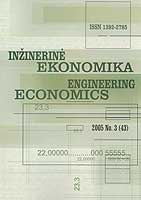Application of the Principles of Total Quality Management in the Knowledge Formation
Application of the Principles of Total Quality Management in the Knowledge Formation
Author(s): Julius Ramanauskas, Jadvyga RamanauskienėSubject(s): Economy
Published by: Kauno Technologijos Universitetas
Keywords: knowledge; information; competence; quality; management.
Summary/Abstract: The economy of developed countries is very much dependent on the production of knowledge, distribution and application. According to foreign researchers and practitioners, future is the age of knowledge, knowledge organizations, new economy that forces organizations to create new methods of work, competences, processes, management methods and the principles of strategic management. The scope of knowledge sectors (education, communications) increases very rapidly. Knowledge is obtained through thinking, experience, observation, information channels and other sources. Modern managerial science has introduced a lot of new terms, theories and the ways of problem solution. These developments have been stimulated by changing business conditions. Thus, the main objective of organizations is to increase both international and international competition. It should be noted that it is not only the people who are the agents of change, but their knowledge and abilities play a crucial role in this competitive world. New management methods are very useful in forecasting the organization’s future, however, human resources are of the utmost importance in this process. Both human and financial capital open wide possibilities for further growth and development. The intensification of these agents under the conditions of growing globalization and competition is the main obligation for every organization and its managerial staff. Seeking to survive in contemporary stiff competition, the organization is to concentrate its efforts on the development of human intellect and managerial practice. Only highly qualified employees with considerable experience are expected to feel and be able to overcome difficulties and support their organization in the struggle for advance. This situation has called for special research in order to ensure the quality of studies, the latter begun the main facet in knowledge development and dissemination. European and other countries have already introduced advanced methods of total quality management. The aim of this research is to determine the main factors influencing the quality of studies. The research was conducted in the period of 2002-2004. The students of Bachelor and Master studies of Lithuania Agricultural University took part in the investigation. So called mind attack method was used for data collection. The method of cause and consequence as well as Paret law were used for the generalization of the results. The investigation has helped to determine the level of the knowledge delivered to the students. Seeking better results in this field, total quality management should be introduced. The introduction of the system of quality management according to ISO 9001 is the obligation motivated by both clients’ requirements and the necessity to increase the University’s service quality through the improvement of studies process management.
Journal: Engineering Economics
- Issue Year: 2006
- Issue No: 1 (46)
- Page Range: 62-68
- Page Count: 7
- Language: English

